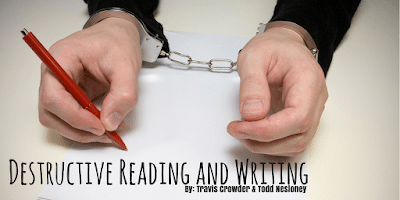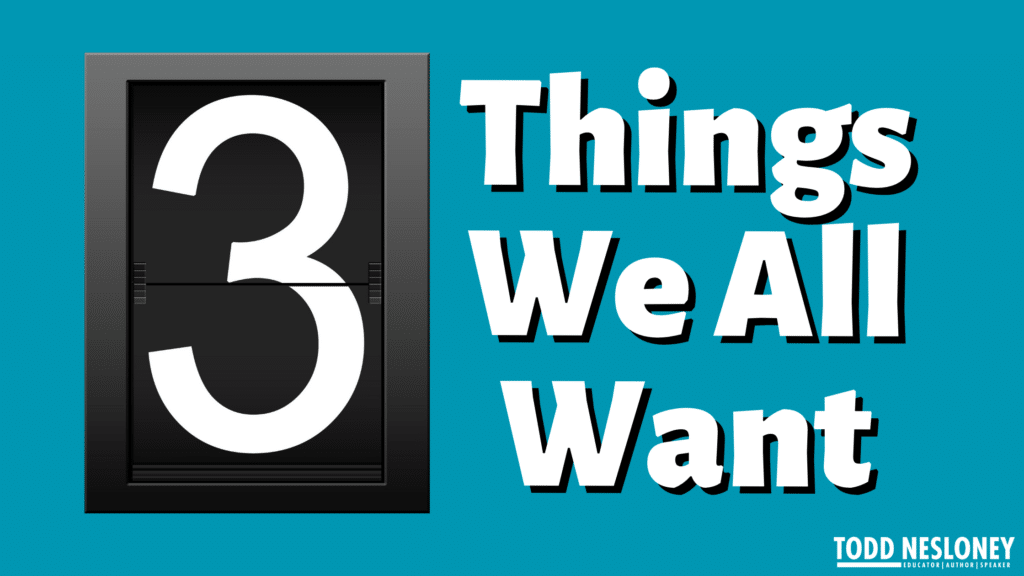Destructive Reading & Writing #KidsDeserveIt
This post was co-written with Travis Crowder.
We’ve all been there at one point or another….that moment where a child needs a consequence and as educators we jump straight to “write this sentence 100 times” or “sit there and read your book in silence for 30 minutes”. It’s an easy consequence. But both of us have come to understand and realize that it truly isn’t what’s best for the child.
You see, when you make reading or writing a form of punishment you create a sense of dislike for those subject matters. You create students whose memories of writing are not some kind of joyus experience of self-expression but instead a dreaded experience of annoyance, frustration, and punishment. You create readers who dislike reading because of the memories of being forced to read because they were in trouble.
From Todd:
As the principal of an elementary campus, we’ve done after school detention as a form of punishment for students. The whole concept of “you wasted your class time with poor choices, so I’m going to waste your time after school”. When we started this consequence, we always had them write sentences. For whatever reason we had this notion that making a child write “I will make better choices” would actually influence them on a deeper level. What were we thinking!?!?
After having some of my writing teachers come to me concerned that this consequence was building a dislike for writing in students, I took a step back to reflect. And those teachers were so right. We WERE building an atmosphere of “writing = punishment”. As a teacher I even remember “making” students read when the class was behaving poorly.
I guess it’s like they say, the first step to moving forward is understanding. After realizing what we were doing to our students I knew I had to figure something else out as a punishment.
That’s when we moved to digging to the heart of the issues. Now our after school detention is a place of meditation and mediation. We have kids stop, evaluate, and think through their choices. We work with them on understanding their emotions and how to react in situations. And you know what? Our discipline has decreased. It never decreased with the sentence writing.
From Travis:
I have been passionate about reading and writing since childhood, and one of my goals, as an educator, is to build the same passion for those subjects in my students. I want them to see reading as a lifestyle, writing as a means of expression, and watch them grow to love the artistry of both. A rich reading and writing life will carry our students far in life, providing them with skills that will sustain them academically. While I have them, I want the year to be full of rewarding experiences, both in their reading and writing lives. There is an exquisite joy when a self-proclaimed non-reader falls in love with a book; when a student who has despised language arts writes a thoughtful poem related to a book he has read; and when hyperactive teenagers silence each other as they prepare for independent reading during class. These are noteworthy, indelible moments, and I treasure them deeply.
Not long ago, I found myself engaged in a conversation with several co-workers, both planning a reward day for their classes. One teacher had told her students that “if they were not eligible to participate in the reward, they would be going into another classroom and would have to read.” Those words stung me. If not participating in the reward, they would be reading, implying that reading was a punishment. I mentioned to this teacher that a room devoted to reading would be a reward for many young people, and it was wrong to vilify books by representing them as activities for punishment. The teacher chuckled and walked from the room.
I structure my classes to give students time to write and read every day, experimenting with different genres and mentor texts that will guide them to be better readers and writers. I always use positive language when I discuss the act of reading because I know that my attitude will affect my students’. I never issue punishments for a refusal to read or when I notice that students are not reading outside of class. When I note those behaviors, I know a conversation is necessary, and I target those students during independent reading time. I want to know why they aren’t reading, if the book is not interesting to them, if they are confused by the events in the book, if the characters or situations do not reflect their interests, and so on. I have never (*knocks on wood*) been unable to get a student invested in a book after such a conversation. It takes some work, but it is well worth the time spent in discussion with the student.
My classes are structured in a way to give students time to read, study, craft, and share. I devote a specific 20-minute space of time each day to independent reading. Students have a chance to read something of interest to them, most of them choosing something from my classroom library. Afterward, we spend time sharing what we read, writing about something that resonated with us, or picking our favorite scenes and describing them. In conferences, I ask students to think about books they have loved, knowing that the tone associated with the word love is one of warmth and comfort. That’s what I want students to experience when they read books they adore. This is book love.
Unfortunately, we have heard the conversations many times from educators about the tendency to engage students in reading and writing as a punitive measure. Some students have learned to loathe any kind of reading and writing because these beautiful activities have been reduced to worksheets and comprehension exercises. When we use language that belittles the act of reading, we do a disservice to our kids. We showcase, with our words, how little we value literature and written expression, and we do so to the detriment of the learning process. No student will develop a love of books and writing if we represent them this way.
As educators it is our responsibility to truly build a love of learning within our students. To have them fall in love with books, dive deep into equations, explore scientific experiments, express themselves and their learning through writing, walk through history lessons, and so much more. We want students to yearn for books, to establish reading habits that take them beyond the classroom. Learning to love education stems from developing a love of reading, and as teachers, as educators, and as thinkers, we have a responsibility to engage our students with fascinating books, where we can see them fall in love with books.
But that love of learning can never be built if we as educators take the easy way out and use any form of education as a punishment. We’ll lose our students, one by one, if we destroy any love they could develop for these subjects. What’s truly important is getting to the heart of the issue. And you can only do that by truly connecting with others and learning who they really are.










